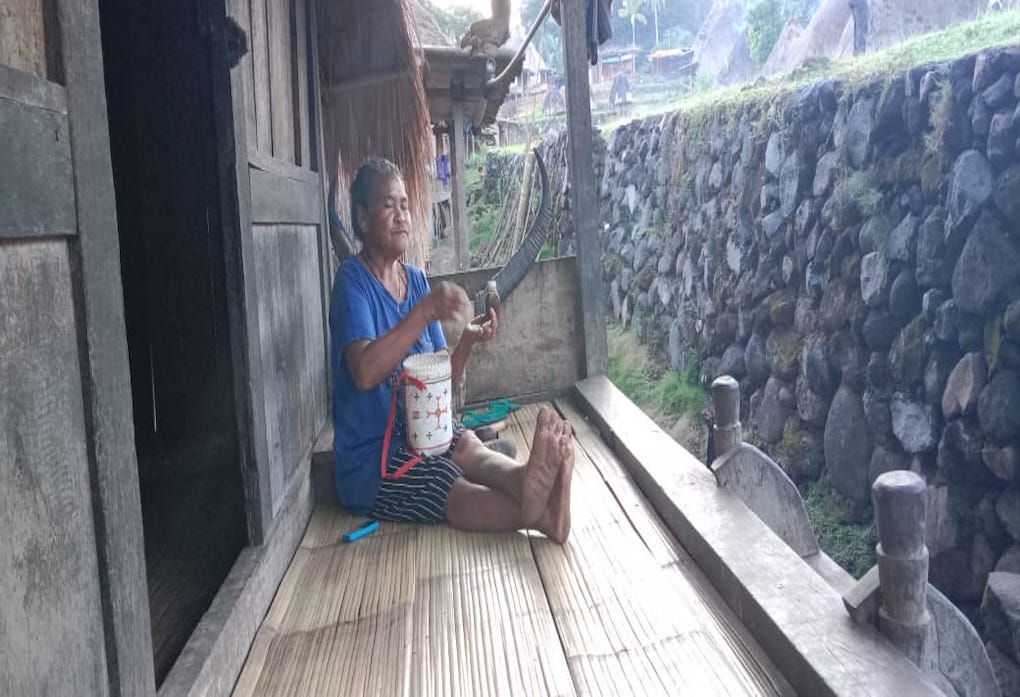Hike to stay with a local tribe in Belaraghi traditional village and experience their ancient traditions and way of life.
Explore the beautiful culture of the Ngadha people of Flores with this short walk to the extraordinary village of Belaraghi village, the sixteen beautiful traditional houses stand tidily in two parallel rows. The houses are built following the architectural style unique to the Ngada people. The construction of Ngada traditional houses typically involves natural and locally sourced materials, reflecting the region’s cultural practices and environmental adaption.



The framework of Ngada traditional houses is made primarily from wooden posts, beams, and planks. These sturdy wooden elements form the structure and provide support for the house. The wood used is often sourced from local forests and is carefully selected for its strength and durability.
The walls of Ngada traditional houses are usually made from bamboo or wooden planks. Bamboo walls are created by weaving bamboo strips together, forming a sturdy and flexible surface. Wooden planks are fitted horizontally or vertically, creating a solid barrier against the elements.
The roofs of Ngada traditional houses are notable for their distinctive shapes. The roofs may be gabled or curved, resembling the outline of a traditional boat. They are typically covered with thatch made from dried grass, palm leaves, or reeds. The thatch provides insulation and protection from the rain while giving the houses a unique and rustic appearance.

Sa’o Lobo, one of the traditional houses in Belaraghi village, holds cultural significance with its unique architecture and symbolic features. The most prominent feature of Sa’o Lobo is its roof, which is shaped like a human figure, representing the women’s house in the village. The roof rises high, resembling a mountain, as ancient beliefs dictate that their spirit or soul resides in the mountains when a person passes away. The house is divided into three distinct parts.
The first part, located at the front, is a spacious terrace where villagers engage in daily activities. Here, you can observe people weaving bamboo, crafting handicrafts, or simply sitting together after a day’s work in the fields. This vibrant area serves as a hub for community interaction and productivity.
Moving further into the house, you enter the living room, which also doubles as a bedroom. Here, you will find thin kapok mattresses arranged for sleeping. This room is also being used as a place to eat. The living room reflects the warmth and unity of the household, providing a cozy space for family members and guests to relax and enjoy meals together.
The last part of Sa’o Lobo, located at the back of the house, serves as a family room and kitchen. This area holds great importance as it functions as the house’s altar. In this room, traditional rituals and offerings take place, honoring the ancestors and the spiritual traditions of the community. The space is adorned with several sacred symbols, signifying the connection between the present and the ancestral spirits. When entering this sacred area, bowing to show respect for the ancestors is customary.
Sa’o Lobo, with its symbolic roof and well-defined interior layout, encapsulates the cultural heritage and beliefs of the Ngada people. Through preserving these traditional houses, the community of Belaraghi village actively upholds their ancestral traditions. It ensures the continuity of their cultural legacy for future generations to appreciate and learn from.



To discover more about Belaraghi village, get in touch with our Indonesia team at sales.indonesia@khiri.com
Aini originally comes from a small island in the eastern part of Indonesia called Sumbawa. A proud mum with 2 sons, Dylan and Keano, she has been working for Sunda Trails since 2006 before Khiri Travel took over the company in 2014. Aini has worked in every department of the company, establishing the team over the years, creating a family working environment. She loves to connect her clients with the local people, allowing them to experience the true warmth of the locals.

